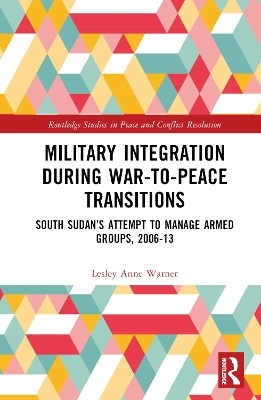
Military Integration during War-to-Peace Transitions
South Sudan’s Attempt to Manage Armed Groups, 2006-13
Seiten
2023
Routledge (Verlag)
978-1-032-11228-2 (ISBN)
Routledge (Verlag)
978-1-032-11228-2 (ISBN)
This book explores why countries undergoing transitions from war to peace decide to integrate armed groups into a statutory security framework, with a focus on the case of South Sudan.
In the 1960s, only 10% of peace agreements included some element of political-military accommodation – namely, military integration. From Burundi to Bosnia to Zimbabwe, that number had increased to over 50% by the 2000s. However, relatively little is understood about this dimension of power-sharing often utilized during war-to-peace transitions. Through an examination of the case of South Sudan between 2006 and 2013, this book explores why countries undergoing transitions from war to peace decide to integrate armed groups into a statutory security framework. This book details how integration contributed to short-term stability in South Sudan, allowing the government to overcome wartime factionalism and consolidate political-military power prior to the referendum on self-determination in 2011. It also examines how the integration process in South Sudan was flawed by its open-ended nature and lack of coordination with efforts to right-size the military and transform the broader defense sector, and how this led the military to fragment during periods of heightened political competition. Furthermore, the book explains why integration ultimately failed in South Sudan, and identifies the wider lessons that could be applied to current or future war-to-peace transitions.
This book will be of great interest to students of war and conflict studies, peacebuilding, post-conflict reconstruction, African security issues, and International Relations in general, as well as to practitioners.
In the 1960s, only 10% of peace agreements included some element of political-military accommodation – namely, military integration. From Burundi to Bosnia to Zimbabwe, that number had increased to over 50% by the 2000s. However, relatively little is understood about this dimension of power-sharing often utilized during war-to-peace transitions. Through an examination of the case of South Sudan between 2006 and 2013, this book explores why countries undergoing transitions from war to peace decide to integrate armed groups into a statutory security framework. This book details how integration contributed to short-term stability in South Sudan, allowing the government to overcome wartime factionalism and consolidate political-military power prior to the referendum on self-determination in 2011. It also examines how the integration process in South Sudan was flawed by its open-ended nature and lack of coordination with efforts to right-size the military and transform the broader defense sector, and how this led the military to fragment during periods of heightened political competition. Furthermore, the book explains why integration ultimately failed in South Sudan, and identifies the wider lessons that could be applied to current or future war-to-peace transitions.
This book will be of great interest to students of war and conflict studies, peacebuilding, post-conflict reconstruction, African security issues, and International Relations in general, as well as to practitioners.
Lesley Anne Warner is a foreign affairs analyst based in Washington, D.C. specializing in U.S.-Africa policy. She holds a PhD in War Studies from King’s College London and a MA in Security Studies from Georgetown University. Dr. Warner has worked at the State Department, the Foreign Affairs Committee in the U.S. House of Representatives, National Defense University, and the RAND Corporation.
1. Introduction 2. Conceptualising Military Integration During War-to-Peace Transitions 3. Armed Groups in Southern Sudan 4. Integration 5. Transformation 6. Disintegration 7. Conclusions
| Erscheinungsdatum | 11.07.2023 |
|---|---|
| Reihe/Serie | Routledge Studies in Peace and Conflict Resolution |
| Verlagsort | London |
| Sprache | englisch |
| Maße | 156 x 234 mm |
| Gewicht | 453 g |
| Themenwelt | Sozialwissenschaften ► Politik / Verwaltung ► Europäische / Internationale Politik |
| ISBN-10 | 1-032-11228-X / 103211228X |
| ISBN-13 | 978-1-032-11228-2 / 9781032112282 |
| Zustand | Neuware |
| Informationen gemäß Produktsicherheitsverordnung (GPSR) | |
| Haben Sie eine Frage zum Produkt? |
Mehr entdecken
aus dem Bereich
aus dem Bereich
Studienbuch
Buch | Hardcover (2023)
De Gruyter Oldenbourg (Verlag)
CHF 62,90
Amerikas Strategie der Vorherrschaft und der Kampf um Eurasien
Buch | Softcover (2024)
NOMEN Verlag
CHF 27,95
erfolgreiche Interessenvertretung durch Prozesskompetenz im komplexen …
Buch | Hardcover (2023)
Wiley-VCH (Verlag)
CHF 58,75


